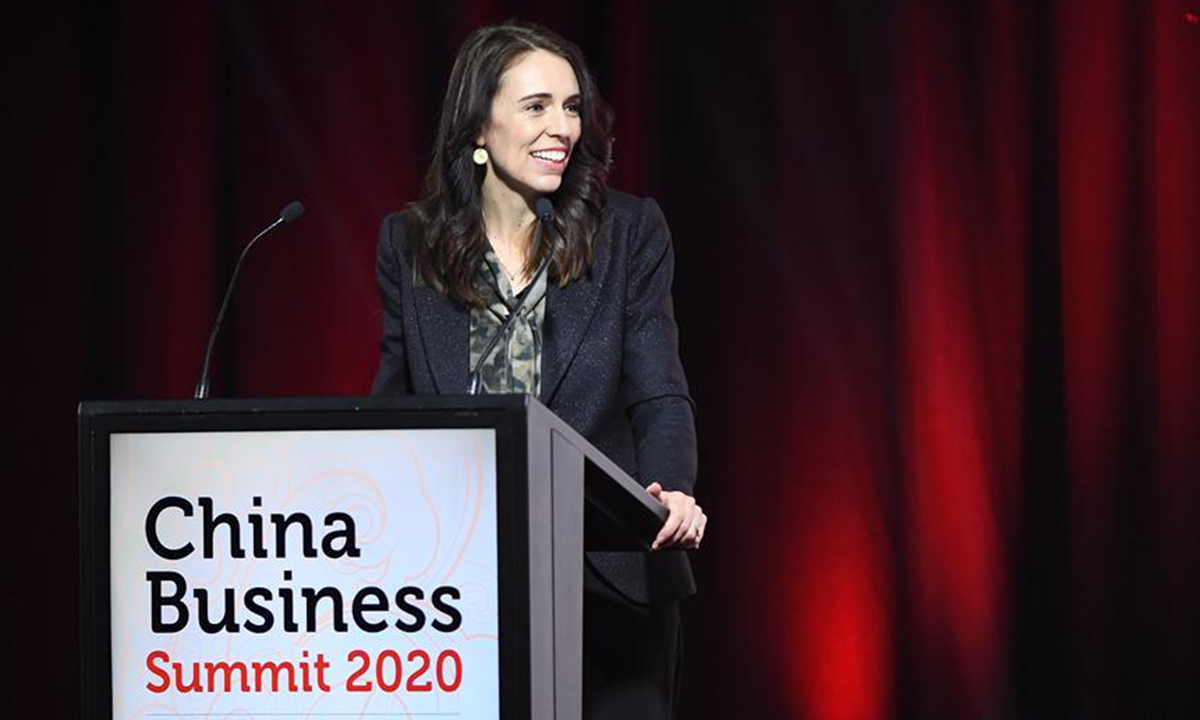How will New Zealand’s general election affect its China policy?
By Zhou Fangyin Source: Global Times Published: 2020/9/6 23:40:15

New Zealand Prime Minister Jacinda Ardern delivers a speech at the China Business Summit 2020 in Auckland, New Zealand, July 20, 2020. Photo: Xinhua
New Zealand's general election campaign kicked off on Sunday. As a member of the Five Eyes intelligence alliance, New Zealand maintains consistent policy strides with other four members on many issues concerning China - including the new national security law for Hong Kong. China has become an increasingly important subject for US politicians who want to win support for their general election in November this year. The question now is: will issues regarding China become a heated topic in New Zealand's general election as well?
Wellington will not attach as much as importance to China as the US does. Its concern over China mainly comes from Washington's pressure. New Zealand does not have great ambition on the international stage and is clearly aware of its own national strength and capabilities.
New Zealand puts more emphasis on economic development, social stability and gaining more pragmatic interests. It lacks sufficient capability to affect global order.
On issues such as Huawei, New Zealand acts slightly different from the other Five Eyes' members. Wellington hasn't conveyed a definite posture toward the Chinese tech giant. In fact, New Zealand already chose to block Huawei from supplying technology for 5G network back in 2018. Yet in the aftermath of UK banning Huawei, Andrew Little, the minister responsible for New Zealand's Government Communications Security Bureau (GCSB), said in July that New Zealand won't follow UK's Huawei 5G ban.
Robert Ayson, a professor of Strategic Studies at Victoria University of Wellington, said New Zealand exploits its ambiguity toward Huawei.
I too concur with this position. As a matter of fact, most countries are reluctant to show a clear stance about Huawei. Banning Huawei isn't in line with their national interests. They are also not willing to irritate the US. This is a painful dichotomy for many. Wellington is clearly aware that Washington's hype that Huawei is a threat to other countries' national security is merely one of many approaches to crack down China. Contrasted with Canberra, which believes itself can play a vital role in Western countries' decisions and hopes to play a big role in international affairs, Wellington tends to be more pragmatic with their diplomacy on the world stage.
But as a member of the Five Eyes alliance, New Zealand cannot perform totally different from the other partners. If it does, they will offend the US. As a result, ambiguity is its best scenario.
New Zealand has to some extent kept an independent China policy. But Wellington still finds it very difficult to be completely independent from the US. Because of the gap in national strength, Wellington cannot resist pressure piled on it from Washington and Canberra.
New Zealand has been a traditional ally of the US. It has also maintained close ties with Australia. One can easily argue that New Zealand's diplomacy is influenced by Australia. Deteriorating China-Australia ties and tensions between China and US, which have escalated in 2020, also bear their gravity on New Zealand's China policy.
In the bigger picture of the Anglo world of the Five-Eyes, if Democrat party candidate Joe Biden is elected this November, then New Zealand may be given more freedom to adjust and improve its ties with China. After all, if Biden shows more respect to traditional US alliances, Wellington will have more flexibility with its foreign policy. However, if US President Donald Trump is re-elected, his administration may continue to exert more influence and pressure on New Zealand. In this scenario, New Zealand will have much less flexibility to adjust its China Policy - unless there is a seismic shift in Trump's China policy.
Furthermore, some Western media outlets seem to exaggerate divergences between China and New Zealand. The British newspaper The Guardian in July posted an article titled, "New Zealand's relationship with China is at a tipping point". This was merely based on New Zealand's response to the national security law for Hong Kong.
Overall, bilateral ties between China and New Zealand have been stable. When New Zealand Prime Minister Jacinda Ardern delivered a speech at the China Business Summit 2020 in Auckland in July, she reiterated that New Zealand-China bilateral relations have been stable. She also said New Zealand-China relations are in good shape, which will continue to bring ample opportunities for both countries and peoples.
However, other members of the Five Eyes, which have deteriorated their relations with China, are reluctant to see stable or even improved China-New Zealand ties. They are unwilling to see New Zealand enjoying the benefits of maintaining a stable relationship with China. In this context, they will spare no effort to sow discord between Beijing and Wellington. Both sides' should be alerted that this is outside agitation. They should remain vigilant not to disturb their stable bilateral ties.
Unlike the US, Canada, Australia and the UK, despite differences in some fields, New Zealand does not have a strong desire to interfere in China's internal affairs. It does not want to cultivate intelligence against China, or engage in a geopolitical competition. Stated simply: China should treat New Zealand differently from other partners of the Five Eyes.
The author is a professor at the Guangdong Research Institute for International Strategies. opinion@globaltimes.com.cn
RELATED ARTICLES:
Posted in: VIEWPOINT,OTHER REGIONS